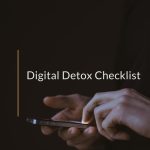Last month, I wrote about preparing for effective rest, and I was asked if I could turn that post into an actual digital detox checklist.
Traditionally, when people practice digital detox, they mean a complete ban on devices and connecting to the Internet. However, to me, this approach seems incredibly binary, extreme and not entirely helpful.
If we switch off all tech for a few days, we find peace, quiet and grounding in other aspects of our lives. However, upon our return, we may find a pile of messages and a long to-do list or some important unanswered messages from our family.
So if you want to plan a digital detox to improve your digital wellbeing habits, I recommend a softer, more nuanced approach with a gradual shift between time with and without devices, with and without an Internet connection.
People and Tasks
- I informed all important contacts that I would be away and unavailable
- I reminded all important contacts that I will be away and unavailable
- I completed all critical tasks and projects
- I paused all other tasks and projects until I return
- I created and shared the handover document with all important contacts
- My handover document includes a crisis plan defining emergencies when people can contact me and appointed backup contacts to deal with crisis too
- I informed everyone that upon my return, I would need more uninterrupted time to catch up and get up to speed
Technology
- I set up a clear, polite and firm email autoresponder providing an emergency contact while I am away
- I organised my notifications – switched off all unimportant ones
- I organised my emails and project-planning apps
- I organised my documents and desktop folders
- I organised my smartphone and tablet apps to prioritise the rest – moved work apps to the second screen
- I planned more time in my calendar to organise my tasks on the first day back
- I use my digital devices offline or less often during the restful time
- I plan for digital-free slots of time and check important news and family messages during a dedicated “connected” time in the day
- I use my digital devices only to connect with the present restful activities
- I use my digital devices to document my restful activities to treasure them more upon my return
- I use my digital devices in off-line mode as much as possible
- I spend the first day in the office adjusting my devices to the work rhythm again – organising incoming messages and notifications, planning my week in my calendar and project management apps
My headspace
- I started slowing down a few days before the annual leave
- I practice mindfulness and grounding to stay in the moment and rest deeply
- I practice not checking my work communication and focus on restful activities instead
- If I think of work while away, I do my best to bring myself back to a softer focus on here and now, knowing others can deal with work
- I practice an accepting, compassionate inner tone of voice (starting with “it makes sense to me that I am a bit tense; it will pass…”)
- I practice gratitude – each day, name three things I am grateful for
- I practice positive feelings – awe, love, appreciation of beauty, joy, spirituality, compassion, love of learning
- I connect with relational joy with others – play, dance, sports
- I pace myself
- If there is a crisis and I need to re-connect with work, I practice transitioning back to restful activities as soon as I can
- Upon my return, I accept making time to read all communication, organise myself and take it easy at first
- Upon my return, I protect my boundaries to go softly and to celebrate my restful time
I hope this list is useful. Of course, we are all different, so if you choose to escape into the wilderness and stay off the grid for a few days, you can still use some of the points here. I would love to hear your ideas that we could include on this list. Let us know in the comments below.

